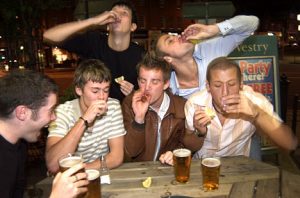A great number of teens today have developed a love for drinking alcoholic beverages as part of their social activities. There’s no harm in doing this as long as it is done in moderation and only on certain occasions. The problem arises if one starts to make it a habit to drink when out with friends.
The Centers for Disease and Control Prevention (CDC) reports that each year, excessive drinking claims the lives of more than 4,300 underage youth. In 2010, this resulted in $24 billion in economic costs. The CDC also noted that underage drinkers consumer more drinks per drinking occasion compared to adult drinkers. In 2015, it reported that 20 percent of young people aged 12 to 20 years drank alcohol while 13 percent reported binge drinking.
So what does this mean for teen drinkers?
Adverse Effects of Teen Drinking
Alcohol consumption at a young age has adverse effects not only to one’s physical well-being but as well as his mental health. It can impair a person’s judgment and put themselves and other people at risk of physical harm and dangerous behavior. Some of the notable consequences include physical and sexual assault as well as higher risk for suicide and homicide.
Many teen drinkers are known to engage more in sex than those who don’t drink. They are seen to more likely have risky sex by not using contraceptives and doing it with a person they don’t even know.
Emergency visits to the hospital are another problem. In 2011, for example, some 189,000 young people under 21 went to emergency departments owing to alcohol use. The primary or secondary diagnosis is often acute intoxication.
With regards to mental health, a teen’s brain development can be affected as well. Studies involving small-scale human brain imaging have discovered that underage drinking can cause harm to a developing brain. If the habit continues for the long term, a teen can alter the direction of his brain development and can cause cognitive defects. This could eventually rehabilitation which can last for months. Rehab centers such as the United Healthcare Substance Abuse Treatment Centers play a significant role in this effort to help teens cope with alcoholism and reforming them.
School issues are also likely to surface when a teen becomes engrossed with alcohol. Possible effects include higher absences and poor or failing grades. A government study published in 2007 found that nearly half of students who mostly have D’s and F’s claimed they engage in binge drinking while an estimated two-thirds of students most of whom have A grades are non-drinkers.
Car crashes are another consequence of binge drinking among teens. According to the National Highway Traffic Safety Administration, more than a thousand young people below 21 years old die each year in car accidents due to alcohol consumption.
Prevention Efforts are Vital
To prevent this problem from worsening, parents need to be involved. Community efforts are as important to monitor the activities of the youth and to lessen their access to alcohol. On the part of the government, strict implementation of minimum legal drinking age laws, increasing alcohol excise taxes as well as comprehensive media campaigns must be done. It would also help if exposure of these youngsters to alcohol-related advertisements is reduced.
Originally posted on December 11, 2016 @ 3:20 pm
